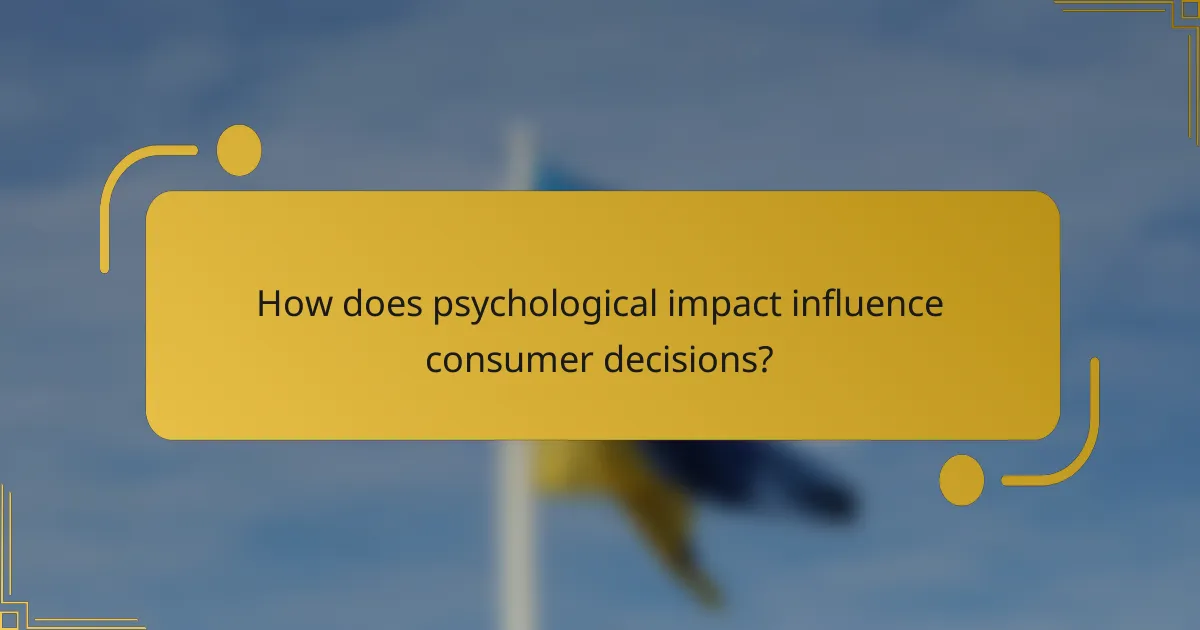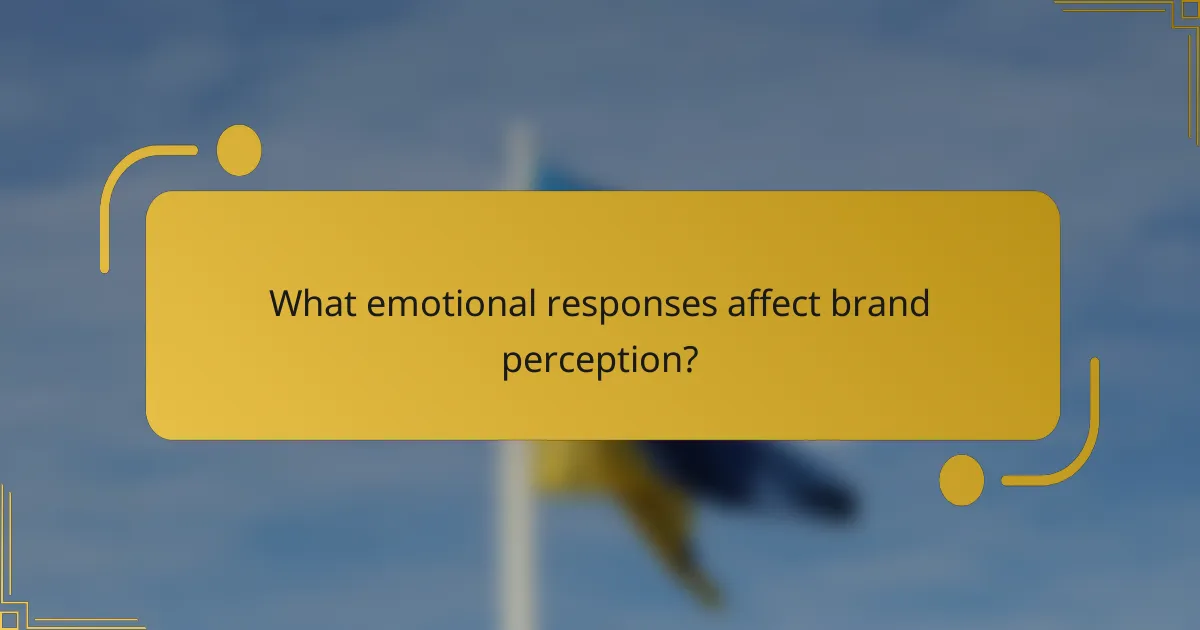The psychological impact of emotional responses is a key factor in shaping consumer decisions and brand perception. By influencing how individuals feel about products and brands, these emotional triggers can enhance loyalty or lead to avoidance, making it essential for brands to understand and manage them effectively. Creating meaningful connections through emotional engagement allows brands to differentiate themselves and foster deeper relationships with their audience.

How does psychological impact influence consumer decisions?
The psychological impact significantly shapes consumer decisions by affecting how individuals perceive products and brands. Emotional responses, brand narratives, and social influences play crucial roles in guiding purchasing behavior.
Emotional triggers in purchasing behavior
Emotional triggers are stimuli that evoke feelings, which can lead to impulsive buying decisions. For example, feelings of happiness or nostalgia can prompt consumers to purchase items that remind them of positive experiences.
Marketers often leverage these emotional triggers by using imagery, music, and storytelling that resonate with consumers’ feelings. Understanding the emotional landscape of your target audience can help tailor marketing strategies effectively.
Impact of brand storytelling on choices
Brand storytelling creates a narrative that connects consumers to a brand on a personal level. A compelling story can evoke empathy and loyalty, making consumers more likely to choose one brand over another.
For instance, brands that share their origins, values, or customer experiences often foster a deeper connection with their audience. This connection can lead to increased brand preference and repeat purchases.
Role of social proof in decision-making
Social proof refers to the influence that the actions and opinions of others have on an individual’s choices. Consumers often look to reviews, testimonials, and social media endorsements to validate their purchasing decisions.
Incorporating social proof, such as user-generated content or expert endorsements, can enhance credibility and encourage potential buyers to trust a brand. Businesses should actively showcase positive feedback and customer experiences to leverage this psychological factor effectively.

What emotional responses affect brand perception?
Emotional responses significantly shape brand perception by influencing how consumers feel about a brand and their subsequent purchasing decisions. Positive emotions can enhance loyalty, while negative emotions can lead to avoidance, making it crucial for brands to understand and manage these emotional triggers.
Positive emotions and brand loyalty
Positive emotions, such as joy, trust, and excitement, can foster strong brand loyalty. When consumers associate a brand with uplifting feelings, they are more likely to make repeat purchases and recommend the brand to others. For example, brands that create memorable experiences or connect with customers on an emotional level often see higher retention rates.
To cultivate positive emotions, brands should focus on storytelling and customer engagement. Utilizing social media to share customer success stories or creating campaigns that resonate emotionally can strengthen the bond between the consumer and the brand. Brands that consistently deliver positive experiences are likely to enjoy long-term loyalty.
Negative emotions and brand avoidance
Negative emotions, such as fear, anger, or disappointment, can lead to brand avoidance. When consumers have negative experiences or perceive a brand as untrustworthy, they are likely to distance themselves from it. For instance, a brand that faces a public relations crisis may see a significant drop in customer engagement and sales.
To mitigate negative emotions, brands should prioritize transparency and responsiveness. Addressing customer complaints promptly and openly can help rebuild trust. Additionally, brands should monitor social media and customer feedback to identify potential issues before they escalate, ensuring they maintain a positive brand image.

How can brands leverage emotional responses?
Brands can effectively leverage emotional responses by creating meaningful connections with consumers, which can influence their purchasing decisions and enhance brand loyalty. By tapping into emotions, brands can differentiate themselves in a crowded market and foster deeper relationships with their audience.
Creating emotional connections through marketing
Emotional connections in marketing can be established through storytelling, relatable content, and authentic messaging. For example, brands that share customer success stories or highlight community involvement often resonate more with consumers. Utilizing visuals that evoke feelings—such as joy, nostalgia, or empathy—can also enhance these connections.
To create impactful emotional marketing, brands should focus on their target audience’s values and preferences. Conducting research to understand what emotions drive their customers can help tailor campaigns that resonate. Additionally, using consistent branding across all platforms reinforces emotional ties.
Utilizing customer feedback for emotional insights
Customer feedback is a valuable resource for gaining emotional insights that can shape brand strategies. By analyzing reviews, surveys, and social media interactions, brands can identify emotional triggers that influence consumer behavior. This information allows brands to adjust their messaging and offerings to better align with customer sentiments.
Brands should actively encourage feedback through various channels, such as email surveys or social media polls. Regularly reviewing and acting on this feedback can help brands stay attuned to their audience’s emotional needs. Moreover, recognizing and addressing negative feedback can turn potential issues into opportunities for building trust and loyalty.

What frameworks help understand consumer psychology?
Several frameworks provide insights into consumer psychology, helping marketers understand how emotional responses influence buying decisions and brand perception. Key models like Maslow’s hierarchy of needs and emotional intelligence in brand strategy are essential for crafting effective marketing campaigns.
Maslow’s hierarchy of needs in marketing
Maslow’s hierarchy of needs outlines a five-tier model of human motivation, starting from basic physiological needs to self-actualization. In marketing, understanding where a product fits within this hierarchy can guide messaging and positioning. For example, a luxury brand may appeal to esteem needs, while a grocery store focuses on physiological needs.
Marketers can leverage this framework by identifying target audience segments and tailoring their campaigns accordingly. Products that fulfill higher-level needs, such as belonging or self-esteem, often command higher prices and foster brand loyalty. Consider using emotional storytelling to connect with consumers on these deeper levels.
Emotional intelligence in brand strategy
Emotional intelligence in brand strategy involves recognizing and responding to consumer emotions to build stronger connections. Brands that understand their audience’s emotional triggers can create more compelling messages that resonate deeply. For instance, a brand that empathizes with customer struggles can foster trust and loyalty.
To implement emotional intelligence, brands should analyze customer feedback, social media interactions, and market trends. This data can inform marketing strategies that align with consumer sentiments. Additionally, training marketing teams in emotional intelligence can enhance their ability to craft messages that evoke positive emotional responses.

How do cultural factors shape emotional responses?
Cultural factors significantly influence emotional responses by shaping how individuals interpret and react to various stimuli. These factors include societal norms, values, and traditions that dictate acceptable emotional expressions and responses.
Variations in emotional responses across cultures
Understanding these variations is crucial for brands aiming to connect with diverse audiences. For example, a marketing campaign that resonates in one culture might be perceived as inappropriate or ineffective in another. Brands must be aware of local customs and emotional triggers to tailor their approaches effectively.
Localizing brand messaging for emotional impact
Localizing brand messaging involves adapting content to resonate emotionally with specific cultural audiences. This can include using culturally relevant symbols, language nuances, and emotional appeals that align with local values. For example, a campaign in Japan might emphasize harmony and community, while one in the United States might focus on individuality and personal achievement.
To achieve emotional impact, brands should conduct thorough research on local cultural contexts and consumer behaviors. Engaging local influencers or conducting focus groups can provide insights into emotional triggers and preferences, ensuring that the messaging is both relevant and impactful.

What are the emerging trends in consumer psychology?
Emerging trends in consumer psychology highlight the increasing influence of emotional responses on purchasing decisions and brand perception. As consumers become more aware of their emotional triggers, brands are adapting their strategies to foster deeper connections and trust.
Impact of AI on emotional marketing
Artificial Intelligence (AI) is revolutionizing emotional marketing by enabling brands to analyze consumer behavior and tailor messages accordingly. AI tools can track emotional responses through sentiment analysis, allowing marketers to create personalized experiences that resonate with their audience.
For example, brands can utilize chatbots that adapt their tone based on user interactions, enhancing emotional engagement. Additionally, AI-driven recommendations can suggest products that align with a consumer’s mood, increasing the likelihood of a purchase.
Future of consumer-brand relationships
The future of consumer-brand relationships is shifting towards authenticity and transparency. Consumers are increasingly seeking brands that align with their values and demonstrate genuine commitment to social and environmental issues.
Brands that foster open communication and actively engage with their customers are likely to build stronger loyalty. For instance, companies that share behind-the-scenes content or involve consumers in decision-making processes can enhance trust and emotional connection.
Trends in ethical branding and consumer trust
Ethical branding is becoming a significant factor in consumer trust, as more individuals prioritize sustainability and corporate responsibility. Brands that adopt ethical practices, such as fair trade sourcing or environmentally friendly packaging, are more likely to attract conscientious consumers.
To build trust, brands should clearly communicate their ethical commitments and provide transparency in their operations. Regularly sharing progress reports on sustainability initiatives can further strengthen consumer confidence and loyalty.



